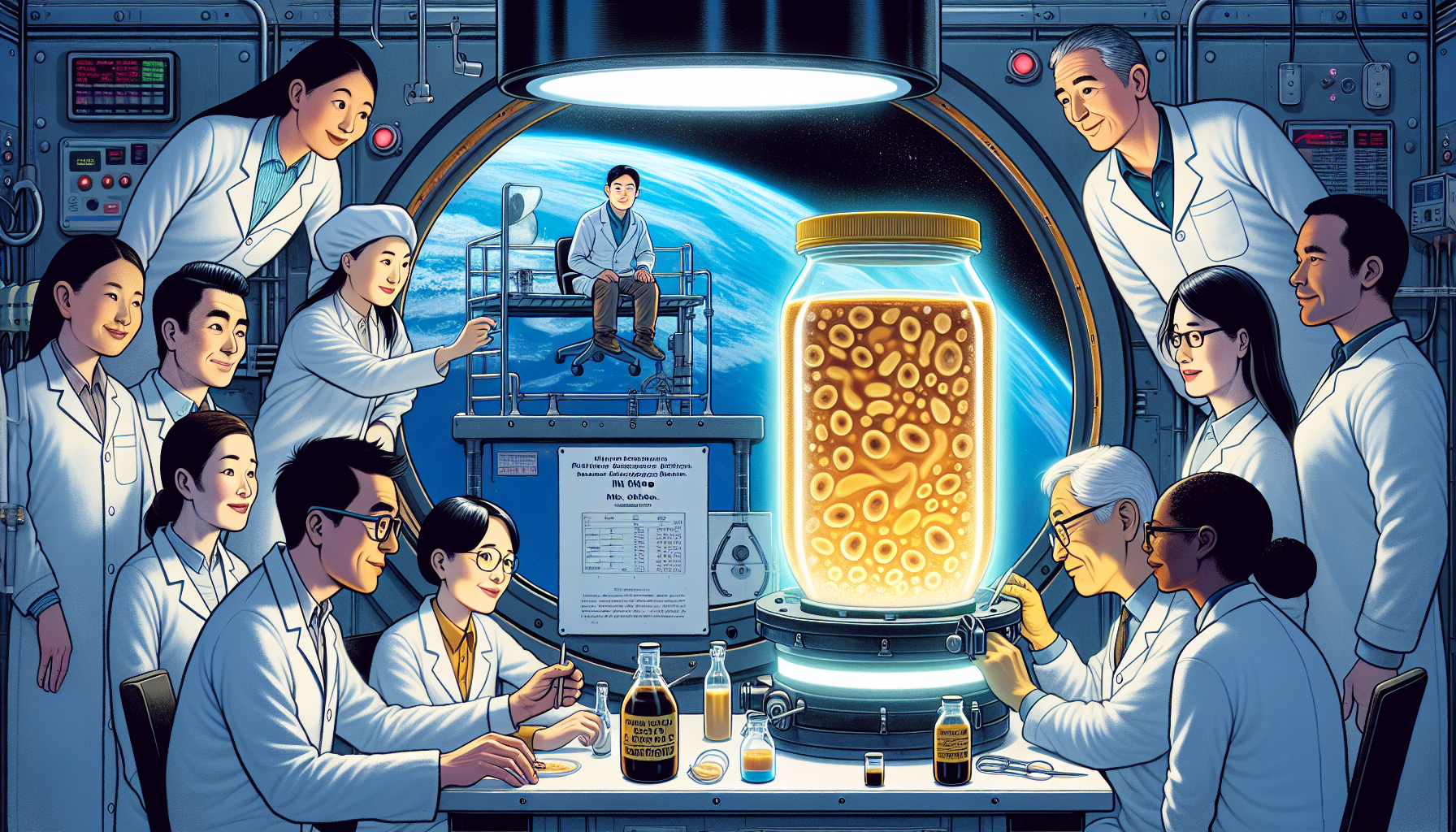
Fermenting Flavors in Space: How Miso Was Created in Orbit
In a pioneering study that merges culinary exploration with space research, scientists from the United States and Denmark have successfully fermented miso on the International Space Station (ISS). The outcome? A nutty, roasted variation of the classic Japanese food — along with a novel perspective in food science.
This research, published in the journal iScience, not only demonstrates that fermentation can occur in microgravity but also introduces an intriguing idea: “space terroir.” Similar to how wine grapes embody the characteristics of their growing environment, foods fermented in space may reflect the distinct qualities of their extraterrestrial surroundings.
Miso in Microgravity: The Experiment
In March 2020, a shipment containing cooked soybeans, rice koji, and salt — the key components for miso — was sent to the ISS. The objective was to study the fermentation process in space, especially under microgravity and heightened radiation. These conditions are known to affect microbial functions, which play a vital role in fermentation.
At the same time, duplicate batches of miso were created on Earth in Cambridge, Massachusetts, and Copenhagen, Denmark. After 30 days of fermentation, the space-produced batch was brought back to Earth for analysis and tasting.
The Tastes of Space: Nutty, Roasted, and Rich in Umami
Researchers were taken aback by the unique flavor profile of the space-fermented miso. While it maintained the umami and salinity typical of conventional miso, it also showcased a nuttier and more roasted flavor. These variances suggest that the peculiar conditions of space — particularly the microgravity and radiation — may affect microbial metabolism and thus alter the end product.
Taste testers rated the space miso favorably, with scores matching those of the Earth-made versions. However, the subtle shifts in flavor hint at a novel dimension in food production: the potential for crafting distinctive, location-specific flavors in orbit.
Exploring Space Terroir
The term “terroir” is commonly associated with the wine industry, describing how a region’s climate, soil, and landscape influence the flavor of wine. In this work, researchers adapted the term to explain how space conditions might engrave unique traits onto fermented foods.
This “space terroir” could have far-reaching consequences for the future of food in space exploration. As missions to Mars and beyond become increasingly viable, astronauts will require sustainable, nutritious, and enjoyable food alternatives. Fermentation — a method that not only enriches flavor but also preserves food and promotes gut health — could provide a crucial solution.
Microbial Variations: An In-Depth View
In addition to flavor, the study uncovered differences in the microbial makeup of the miso from space versus that from Earth. Microbes are vital for fermentation, and their behavior can be shaped by environmental variables. In space, these microbes may adapt to microgravity and radiation in ways that modify their metabolic processes, resulting in the altered flavor profile.
This finding indicates that fermentation in space could give rise to entirely new microbial ecosystems — and potentially entirely new categories of fermented foods that cannot be replicated on Earth.
The Future of Space Fermentation
As space agencies and private enterprises prepare for extended missions, food sustainability emerges as a pressing issue. Fermentation presents a promising pathway for generating nutritious, flavorful foods in space. It also optimizes the use of scarce resources since fermented foods can be produced from basic ingredients and stored for lengthy durations.
Additionally, the mental health benefits of flavorful, comforting foods like miso soup should not be overlooked. In the solitary and challenging environment of space travel, familiar flavors can offer critical comfort and a sense of well-being.
Conclusion
The successful fermentation of miso aboard the ISS represents a pivotal advance in the domain of space food science. It illustrates not only the viability of fermentation in microgravity but also the possibility of producing unique, space-influenced flavors. As we envision a future where humans inhabit and work beyond Earth, grasping how to create and enjoy food in space will be essential — and delicious.
Frequently Asked Questions
What is miso, and what made it suitable for this study?
Miso is a traditional Japanese fermented paste crafted from soybeans, rice koji, and salt. It was selected for this study due to its heavy reliance on microbial fermentation, making it an excellent choice for exploring microbial behavior in space.
What does “space terroir” signify?
“Space terroir” pertains to the distinctive environmental factors of space — such as microgravity and radiation — that affect the flavor and microbial composition of fermented foods. It’s a twist on the term “terroir” used in winemaking.
How did the miso from space differ from that made on Earth?
The space miso preserved similar umami and salty characteristics but had a nuttier, more roasted taste. It also displayed a different microbial composition, indicating that the space environment impacted the fermentation process.
Is it possible to utilize fermentation for other foods in space?
Definitely. Fermentation could be implemented for various foods, including vegetables, dairy, and even meats. It’s a sustainable technique for food preservation, flavor enhancement, and gut health support — all vital for extended space missions.
What advantages do fermented foods provide for astronauts?
Fermented foods are packed with probiotics, promoting digestive health and immune function. They also offer complex flavors and can be created from simple ingredients, making them perfect for space travel.
Is this the first instance of food being fermented in space?
Yes, this is among the first recorded cases of successful food fermentation in space. It paves the way for continued research into food production in space.
How might this research influence food on Earth?
Understanding microbial behavior in extreme settings could lead to new fermentation methods and flavor profiles here on Earth. It may also drive innovations in food preservation and sustainability.